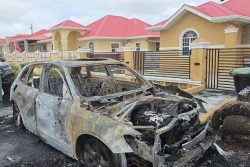The capture of Servando ‘La Tuta’ Gomez Martinez, head of the brutal Knights Templar cartel in the western state of Michoacan has been hailed as a major success for President Enrique Peña Nieto. La Tuta has been Mexico’s most wanted man since the capture last February of Joaquín Guzmán Loera (‘El Chapo’), head of the Sinoloa cartel, and arguably the most dangerous and influential cartel boss in the country’s history. On Twitter, President Peña Nieto said La Tuta’s arrest “strengthened” Mexico’s rule of law and brought the country closer to peace. But while the capture of such dangerous men shows that concerted state action can dethrone the leaders of the country’s fiercest cartels, it will do little to affect the underlying causes of the violent drugs war that has claimed more than 100,000 Mexican lives during the last nine years.
One indication of the power wielded by cartel bosses is the size of their protection details. Often these are elaborate mechanisms comparable to the security available to elected heads of state. At the time of his arrest, according to the New York Times, El Chapo’s entourage was equipped with “97 large guns, 36 handguns, 2 grenade launchers, a rocket launcher, and 43 vehicles, several of them armored.” La Tuta’s smaller detail included eight bodyguards, a grenade launcher (with three grenades), assault rifles and a machine pistol – enough to safeguard him while his gang imposed its reign of terror over the state of Michoacan, but not enough to deter the Mexican state.
From afar the federal government’s ability to capture such well-guarded men might appear to be a turning point in the drugs war, but few local observers would endorse such an optimistic analysis. Mexico’s long and painful history of failing to deal with corruption and impunity is one of the primary reasons its drug cartels have thrived, and there is a compelling body of evidence that criminal enterprises have penetrated and co-opted mainstream businesses, local governments, and politicians at the highest levels of national government. There is also ample evidence that foreign businesses are quite happy go along with these corrupt arrangements. La Tuta, for instance, reportedly made just as much money selling illegally extracted iron to Chinese businessmen as he did from his monopoly of the drugs trade in Michoacan.
In a preface to Narcoland: The Mexican Drug Lords And Their Godfathers – a groundbreaking exposé by the journalist Anabel Hernandez of the overlapping political, commercial and narcotrafficking networks in Mexico – Roberto Saviano notes that the real problem of addressing the depth of corruption in Mexico “is not the mafia that has transformed itself into a modern capitalist enterprise—it is capitalism that has transformed itself into a mafia.” Saviano’s insight is supported by a wealth of investigative journalism that has revealed the complicity of state actors in human rights violations throughout northern Mexico, often with the support of foreign companies which rely on abusive officials to guarantee that their investments will not be jeopardised by local critics.
Shortly before the capture of La Tuta, the director Alejandro Gonzalez Inarritu made headlines when he used the closing lines of his Oscar acceptance speech to encourage Mexicans to “find and build the government that we deserve.” Inarritu’s rebuke to his government’s propaganda is a necessary reminder that during the last two years there has been a litany of high profile mass killings in which state agents appear to have been complicit – most notoriously the disappearance of the 43 Ayotzinapa students – and that in addition to 100,00 deaths, the country’s ill-considered drugs war has also produced more than 20,000 disappearances, driven 200,000 people from their homes and exposed a large section of the most vulnerable members of the population to a wave of unprecedented violence, kidnapping and extortion.
The capture of a few well-known cartel bosses will do nothing to alter the many social, cultural and political failures that have allowed the drugs war to metastasize into the ongoing crisis it has become.







